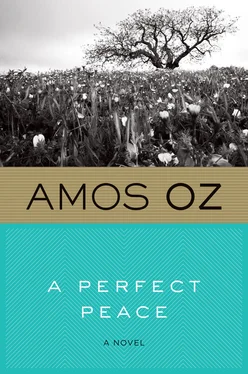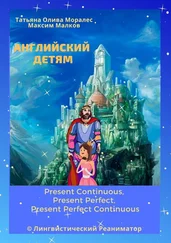Yonatan adjusted his pack on his shoulders and shifted his rifle from his right hand to his left. He sniffed the air, then made up his mind to cut a little more to the north. Was that nearest hill on his right Jabel Butayir or Jabel-et-Teybe? Soon the moon would be up. But what was that rustling? A black shadow flitted past. A night bird? Am I the only thing breathing here? Or are they lying in wait for me, watching me this very moment? Quickly, with a light click, he cocked his rifle and stood stock-still. His heart beat wildly. He slipped shut the safety catch and forced himself to resume walking. Nothing to worry about. I'm heading straight for Wadi Musa. I'm not afraid because I don't care. Not tired, not hungry, not thirsty. Efrat has a brave papa. And the night has just begun.
What's out there? Who's shining that light on me? Is that an enemy outpost? A Bedouin torch?
It was a softly muted, otherworldly light. A slight shudder ran along the ridge line, and then, red, enflamed, huge, the moon emerged from behind the Edomite range. In an instant the world was transformed. Bright swaths of moonlight streaked the swarthy mountainsides. Ripples of the pale light eddied in the plain. Lifeless silver flowed silently over the lifeless earth. Here and there, a rock loomed. Fast as he walked, Yonatan could not escape the shadowy specters that split off from his body, dancing in ghastly shapes.
They are the ghosts. The Syrians we've killed. The Arabs my brother bayoneted. And Rimona naked on a white sheet, a frozen smile on her marble face. My parents in the valley of the dead, her head wrenched back, his sunk on his chest, amidst the ruins of Sheikh Dahr, soaked in the dead pale silver. They are dead. I am alive. I've murdered them all.
He fell face down on the parched, salty ground. What have you done, you madman, what have you done, it's your death. He grabbed his rifle, released the safety catch, and squeezed the trigger as hard as he could, whimpering like a dog. The butt kicked back against him. The smell of the gunpowder turned his stomach. The long volley merged with the pounding of his heart.
The desert and the wadi walls returned the fire with high, whining echoes, bullet for bullet, each reverberation more distant and muffled, yet proliferating, as if all the mountains around had taken up the challenge and were zeroing in on one another. The silence returned, and Yonatan knew there was no going back. He loaded a second clip and fired it off in one burst, raising his rifle, catching the moon in his sights, and blasting away at it to the last bullet.
He undid the buttons of his pants. He urinated in fits and starts, pissing and puking, puking and gagging out loud, his knees knocking, his stomach churning, his pants wet with his pee and his boots spattered with his vomit. A perfect target in the light of a full moon.
Panic-stricken, he spun around and took off on the run. He ran as he had never run in his life, stumbling without falling, lurching blindly down inclines, gasping for breath, sobbing aloud, a vicious stitch in his rib, his rifle held before him with both hands as if he were leading an assault, and he did not stop running even when his feet encountered the gravel bed of Wadi Araba again, he did not stop running until, ringed round by cobwebs of moonlight, he fell to the ground, face down in the silvery sand.
It was nearly three in the morning when he readied the trailer at the far end of the camp at Ein-Husub. The old man wiped his face with a filthy, tattered towel soaked in gin and icewater. It was half-past-three when Yonatan began to cry.
He slept all of the next day. In the evening the old man made him a salad and served it with dark bread and jam. Within a day or two Yonatan was doing the cooking. Before the week was out he was accompanying Tlallim on expeditions to survey sites and on forays to collect rock and mineral samples from all over the desert. He cleaned up the trailer. He scrubbed the theodolites. The old man called him malchik. He brayed with laughter every time he remarked, Pshol von, ty chudak, and Yonatan would respond with a faint, bewildered smile. One day, Yonatan happened to see that smile reflected in a broken mirror in a corner of the trailer, and he was struck dumb. It was an exact replica of Rimona's, the woman who had been his wife.
"Listen. Once I had a little friend who taught me a Russian proverb—'He who helps a friend in woe is like a fur coat in the snow.'
"A lie!" roared the old man. "No such proverb in the whole Russian language! Never was! Never will be! A bald-faced lie!"
But nothing else is. I'm rid of my allergy. I've stopped smoking. And I've grown a beard. I'm beginning to understand. And my heart is getting true because everything is looking up. Maybe I should go see Michal tonight? Why not?
At last the winter came to an end. The rains had stopped. The clouds were gone. Punishing winds gave way to soft sea breezes. By the last week of March Srulik could sit every evening on his little porch and watch the flocks of migrating birds cross the reddening heavens on a northwesterly course.
Despite the winter floods the crops did well. By April the barley and wheat fields had spread ripples of green all the way to the hills in the east. Only now did the apple orchards burst into full bloom. The pears put on their nuptial raiment of trembling white blossoms, and westerly winds carried their carnal scent. The mud roads had dried up. The fig, the almond, and the walnut put forth their rejoicing leaves. Dormant grape arbors reawakened to their entwined green lives. The rose bushes, pruned during the winter, were again in bud. Early each morning, long before sunrise, the whole kibbutz echoed with the outcry of sparrows in treetops. The hoopoe tirelessly repeated its daily matins and doves cooed insistently under the eaves.
One Saturday, while walking in the ruin? of Sheikh Dahr, Anat suddenly noticed, and quickly pointed out, five gazelles outlined against the sky. No sooner had Rimona, Zaro, and Udi seen them too than they were gone. In the courtyards of the Arab village the bougainvillea blazed through the stones, wild grape vines inched their tendrils up the smashed archways, acacia trees spread a fragrance thick as thieves. In a wagon hitched to a tractor, Udi hauled away from the ruins a large grindstone, a stone lintel, and a blackened threshing sled, all of which he displayed prominently in his garden. Forgotten, perhaps, was his plan to dig up a skeleton from the Arab graveyard and turn it into a scarecrow to shock the old-timers. Perhaps he had only been joking. Azariah brought back for Rimona a large, cracked pottery jar. He planted a red geranium in it and placed it in front of their home. "Yoni will like that a lot," she said. In her voice he heard neither joy nor sadness.
Every morning at four Little Shimon took the sheep out to pasture on the hills to the east. And once a day Etan R. cut a wagonload of alfalfa to scatter among the feedstalls in the cowshed. In the afternoon, their communal chores finished, the members of the kibbutz once again began to tend their little gardens, hoeing, pruning, and mowing. The news on the radio continued to report tension on the northern border, infiltrators, the imminent danger of war, the vigorous protests and warnings lodged by Prime Minister Eshkol with the ambassadors of the Four Powers. Sometimes, between one news bulletin and the next, an old Hebrew song tugged at the heartstrings.
Life went on. Except that in mid-April Stutchnik suddenly died.
One morning, on his way back from the night milking, he had entered Srulik's office in his boots, trailing a barnyard smell, and shyly asked for permission to send a telegram. To his only daughter in Kiryat Gat to come at once and to bring her husband and children with her. When asked what the happy occasion was, Stutchnik turned pale and leaned on Srulik's desk. No more could be got out of him than a vague reference to something personal. Srulik wondered at the meekness in Stutchnik's voice. Gone were the days when he quickly lost his temper, argued with anyone in sight, attacked everything under the sun by dismissing it as a muktse, forever righteous and angry.
Читать дальше












